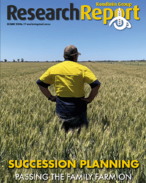This article is 7 years old. Images might not display.
DAFWA veterinary officer Anna Erickson urged sheep farmers to be alert for pregnancy toxaemia in lambing ewes over the coming weeks.
“Pregnancy toxaemia can happen when a pregnant ewe doesn’t get enough high energy feed during late pregnancy, a time when energy requirements are higher,” Dr Erikson said.
Ewes with twin pregnancies are at higher risk because of the extra sustenance needed to grow two lambs.
“Many ewes in Western Australia were joined on green feed and in very good condition, due to good summer rains increasing the number of ewes carrying twins,” she said.
Conditions also supported a higher number of over-fat ewes, which are also at increased risk of pregnancy toxaemia.
“A lack of rain in April has meant the early green feed has now largely disappeared, prompting many farmers to hand feed sheep. Hand feeding as green feed supply dries up can mean a decline in energy intake, which can precipitate pregnancy toxaemia.”
A sign for ewes with pregnancy toxaemia include their behaviour is generally ‘dopey’ and not alert.
Even when feed is placed in front of them they may not eat, and if lifted they seem to lack the will to walk and instead, lie down again.
The ewe may also separate from the rest of the mob and be slow to come up to feed.
The DAFWA veterinary officer said pregnancy toxaemia can be treated with products containing propylene glycol given as a drench, repeated daily until a response is seen.
“Injectable 4-in-1 calcium products contain a small amount of glucose and will produce some response, but as this is short lived, it should be combined with drenching with propylene glycol,” Erikson said.
“Treatment is much more effective when cases are identified early, that is, before ewes go down,” she said.
DAFWA advises farmers to contact a private veterinarian for information or if they see unusual signs of diseases including death or neurological signs such as lack of responsiveness affecting more than a couple of sheep.
The department website has more information about pregnancy toxaemia in ewes and feed budgets and feeding pregnant ewes.
For more information contact Anna Erickson, Veterinary Officer, Narrogin on +61 (0)8 9881 0211.






















